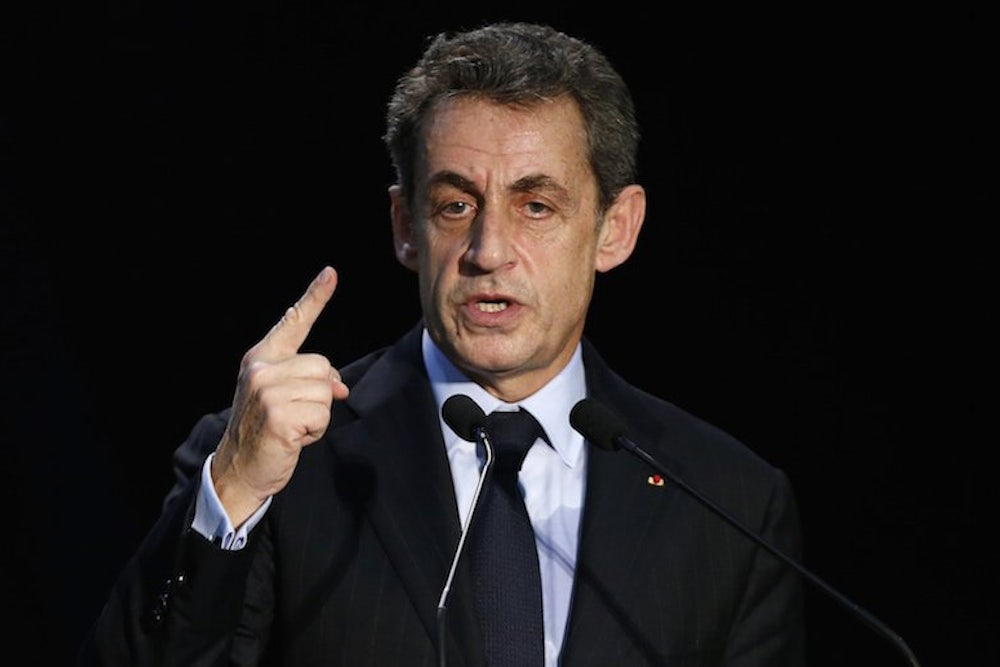On the eve of the Israeli election, with polls showing him behind, Prime Minister Benjamin Netanyahu of Israel unleashed the demons of race and religion. He asserted that there would never be an independent Palestinian state on his watch, then warned on his Facebook page that “the right-wing government is in danger” because “Arab voters are going en masse to the polls.” The strategy worked—enough of Netanyahu’s base turned out to guarantee another term of office—but the consequences are grim: He now faces the task of governing a nation that he has helped cleave in half.
No doubt a coincidence, but on the eve of local elections that will have national repercussions in France, former President Nicolas Sarkozy is borrowing from the same playbook. In a Hail Mary this week worthy of Netanyahu’s last minute heave, Sarkozy announced his opposition to students wearing the Muslim headscarf (not to mention the burqa) at university. Moreover, he declared that grade and high school cafeterias should no longer offer halal alternatives to their Muslim students. On those days pork is served, these students must either bring their own lunches or stare at empty plates. Tellingly, Sarkozy outdid the Marine Le Pen’s Front National, which had hesitated to embrace the “one meal fills all” claim. In the infernal spiral these two parties have created, the FN is now echoing Sarkozy’s promise to end halal meals at school.
Sarkozy has aimed these frantic appeals at the growing number of voters attracted to Le Pen’s party. According to the latest opinion polls, Sarkozy’s political vehicle—the former UMP, newly baptized as “Les Républicains”—is laboring at 29 percent of the vote. It is struggling to overtake the front-running FN, which leads at 31 percent ahead of the first round of voting on March 22. (The ruling Socialists, by contrast, are limping along at barely 20 percent.) When the two parties face off in the second round on March 29, FN is poised to win a handful of départements (France’s basic administrative units). If they succeed, it will represent a historic—and tragic—turning point in French history.
Ever since she assumed the party’s leadership from her father, Jean-Marie Le Pen, in 2011, Marine Le Pen has undertaken an even brasher rebranding campaign than the UMP's. She purged the skinheads, neo-Nazis, and Holocaust deniers from the party all the while making a great show of embracing the republican principles that were never especially dear to her father. In fact, Le Pen fille has even suggested the time has come to change the party’s name—a remark denounced by her father, who now serves as honorary president.
But has the party really changed? As a recent salvo of recent investigative articles in the French media have revealed, several dozen FN candidates have used social media to spew anti-Semitic, homophobic and racist remarks. (The newspaper Libération has provided a color-coordinated map of these so-called dérapages, or slips of the tongue, which makes France appear as if it has come down with a serious case of measles.) And just this week, the FN-aligned mayor of Béziers, Robert Ménard, renamed the town’s principal street. Formerly called “Rue du mars 1962” to commemorate the peace accord between France and newly independent Algeria, it is now carries the name of one of the French officers who tried to overthrow France’s government in 1961 to protest Charles de Gaulle’s decision to sign the treaty.
Prime Minister Manuel Valls insisted “nothing good would come” of antics such as Ménard's, but one wonders. The FN has adroitly played on a growing nostalgia for a certain idea of France—a Gallic Lake Wobegon, where all the women are strong, all the men are good-looking, and all the children are above average (and everyone is white). Though Marine Le Pen has distanced herself from her father’s toxic language, she expertly exploits the deepening unease and fear many voters feel. Shortly after she assumed leadership of her party, she expressed her shock at the sight of Muslims praying on certain streets in Paris, describing it as a “new occupation.” Rather than concluding this was because there are too few mosques—a persistent (and legitimate) complaint of French Muslim leaders—Le Pen concluded it was evidence of too many Muslims.
In the wake of the Paris terrorist attacks, Le Pen’s depiction of a Muslim-occupied France has found many new admirers. Nearly 70 percent of the respondents in a poll taken last month believe there are “too many immigrants” in the country, while one in every three does not consider Muslims to be like other French citizens. Moreover, one of every two French now wish to see the reestablishment of the death penalty—reflecting a demand made by Le Pen in the aftermath of the January massacres.
It is too early to tell whether what Sarkozy’s “punitive secularism,” as Libération calls it, will bring enough disaffected voters back to his camp. But the cure may well prove more dangerous than the disease. Rather than countering the FN’s xenophobic worldview, Sarkozy has instead cannibalized it. It may well be, as political journalist Annette Lévy-Willard told me in a recent conversation, Sarkozy is not a racist. It does seem that the former president’s motivations are instrumental, not ideological. Like the little Dutch boy, he is racing from leak to leak, trying to prevent the republican dike from giving way to the great surge of xenophobia channeled by the FN. But history will record that some of those cracks were of his own making.
